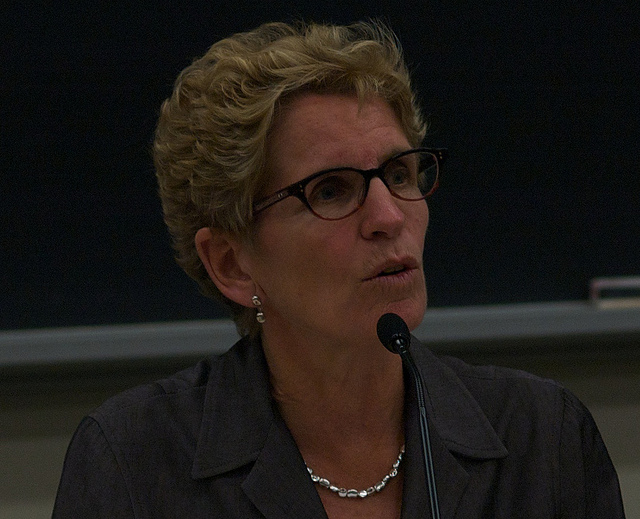Another golden moment is slipping away. I don’t mean the Leafs (not only). I mean the Ontario election we might have had, the one about taxes, with a debate on what it means to be a society. I adore elections like that, rare as they are: the 1988 free trade election, the 1992 Charlottetown referendum (technically not an election, but still a vote). They stand out because they aren’t about who wins; they’re about what matters.
Premier Kathleen Wynne seemed up for it. She proposed solving the Metro transit catastrophe with “dedicated” taxes. She even teed them up: half a per cent to HST, a gas tax rise. Then she raised her bet: a provincial pension plan, since the Stephen Harper government won’t do anything to address that situation.
What’s delicious about this is: it would tack straight into the wind of the last 30 years, in which taxes were allowed to go only down, never up. It would join battle with the Zeitgeist, and dovetail with this week’s resignation of Harper finance minister Jim Flaherty, who led a “tax jihad,” in Eugene Lang’s felicitous — or at least irresistible — phrase. Ontario Tory Leader Tim Hudak was perfectly cast.
So was NDP Leader Andrea Horwath. She’s the Tony Blair of Canadian social democracy. Blair brought Margaret Thatcher’s savage policies to Britain’s Labour Party and Horwath did it here, with the usual time lag. “There’s no way we’re going to support new taxes, whether it’s gasoline tax of 5 or 10 cents, whether it’s a half a per cent increase in the HST,” she thundered (or Thatchered). I grant it’s a bit subtler: she said she’d hike corporate taxes, which wouldn’t bring in the needed funds but sounded fair. In fact it echoed that noble revolutionary cry: No justice, no peace. In this case: No justice, no transit. Whoops, that brings it down to earth (as in cutting off your nose to spite your face); it also makes you wonder if those resonant Occupy attacks on the 1 per cent mightn’t have diverted energy into rage instead of building toward real change.
So let the electoral fireworks commence: leaders, take your places. What makes us human? It’s our interconnectedness and interdependence. That conditions everything, from crossing a street to turning on a tap. We are webs of interconnection. Most good things cost money and taxes are how we monetize many of those mutual needs. Among good things are non-dehumanizing transit, decent schools, roads that don’t rise up to devour your car — the pensions issue bites because it raises those issues not just horizontally, in space, but vertically, through time, between generations. Everyone stretches out their hands to embrace and support everyone around them, often informally but sometimes via taxes paid. I’m for fairness and I hate the free ride the rich routinely get, but it’s more urgent to construct a social reality that serves most people than be sticklers for it all balancing out. Their time will come, eventually.
One peculiar implication of this debate is that the best way to make taxes more acceptable is to raise them so that people see results, like better transit and pensions. They have to be high enough to accomplish something. That’s why high tax countries generally register fewer complaints than low tax places like us or the U.S. It makes perfect sense, since people who see fewer results rightly ask why they’re paying taxes. That’s the Harper-Ford formula: cut taxes, services languish, people don’t see the point and don’t wanna pay. Vote for me and I’ll cut your pointless, useless taxes.
Alas, it wasn’t to be. Wynne’s heavy thinkers have apparently decided that no one gets elected today by promising more taxes. Better to do it by stealth. Get the transit and pensions going, let people see results, then introduce taxes to fund them. I grant, reluctantly, it sounds savvier, but I’ll sorely miss the debate that didn’t happen and never may.
Canada’s only woman prime minister, Kim Campbell, said 21 years ago, on her way to epic defeat, that elections were no time to discuss serious issues. She was possibly right (and possibly misquoted). But as the talmudic sage, Hillel, sighed, “If not now, when?”
This article was first published in the Toronto Star.
Photo: Paul Schreiber/flickr



